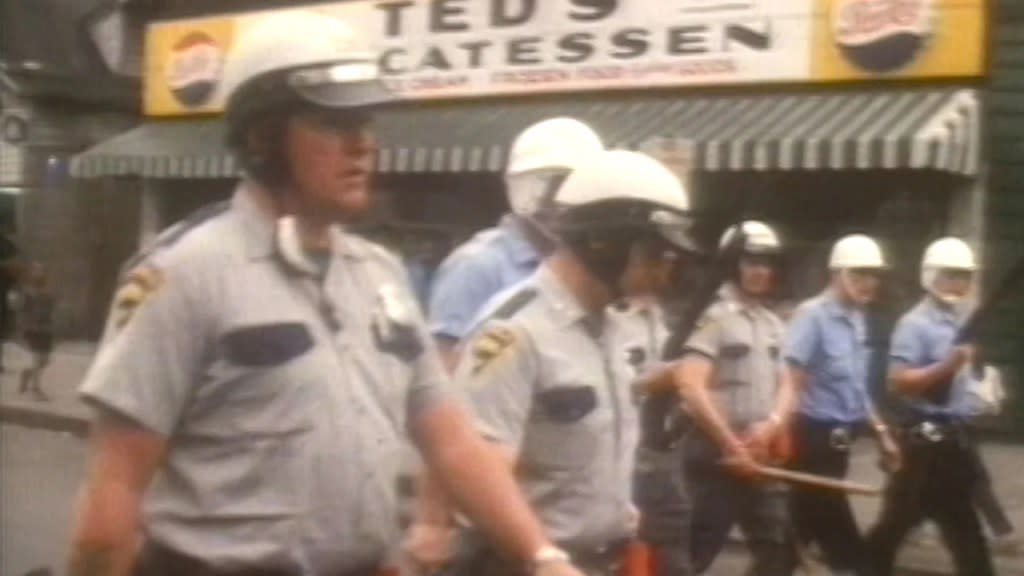‘Power’ Review: A Necessary Examination of America’s History With the Police

“This film requires curiosity—or at least suspicion,” whispers the opening lines of Yance Ford’s Sundance documentary “Power” from behind a dense black nothingness overtaking the screen. “I’ll leave that up to you.” With that plea, the world of Ford’s striking and necessary film explodes like a bomb, infecting those in its path with harrowing realities they can never un-know.
The film is utterly singular to American design—as is the policing system in question—and a masterclass in effective documentary work that exists solely to deliver an impalpable truth.
The foundation for a film as compelling as this one comes from the structure of the narrative. Ford and his co-writer, Ian Olds, meticulously outline the story of policing as an American institution, from its horrific roots through to the untamable beast that has become its current form. They use over seven tentpoles to divide the narrative, each section focusing a crucial limb of the overall system that keeps race-biased and class-biased policing intact.
This framework allows for the viewer to truly consume the intricacies of, ultimately, the argument for abolition—and after watching this film it’s hard to imagine finishing it and having any other stance—as well as the dark histories of how we got here in the first place knowing what we actually set out to do when policing as a rough concept emerged. It’s not stuff we’re taught in schools and the history behind this major systemic issue is dense and important, yet Ford and Olds easily strip it to its most vital, digestible throughline by streamlining the evolution. The film’s narrative is so seamless that it allows us the room to have the curiosity and suspicion it blatantly asks of us at the top of the show.
Though these sections were structured by Ford and Olds they are brought to life by an utterly incredible cast of talking head interviewees. Ford curates a top-notch set of roughly ten experts—scholars, former law enforcement agents, professors, intellectuals, and more—who have the concise ability to contextualize policing within both modern and historical confines.
They are our guides down the yellow brick road of trauma this film spotlights and they quickly feel trustworthy and deeply knowledgeable about the nuances of policing. Their strong credibility lends to the overall strength of the project. The doc also includes a New York City stop and frisk victim who speaks without masking his identity. His testimony is incredibly raw and emotional, especially in moments where he speaks of eventually “identify[ing] with the profile they put on you” as a person who was stopped often.
Having first hand accounts like this, and the ones from Black members of law enforcement, further contextualize Ford’s central thesis works to the advantage of the core abolitionist argument. After all, if this unchecked level of pain is able to be consistently inflicted, are we human if we look away and accept it?
In service of that point, a film like this simply wouldn’t be complete without the calculated use of archival and body cam footage. Much of this footage is utterly vicious and disturbing but necessary to include. In a less meticulous, less intelligent documentary, much of the included footage would feel like gratuitous overkill. But because it is visceral and puts the audience right in the middle of the dread and panic of these horrible incidents, it only serves to support Ford’s call to arms.
He knows exactly what he’s doing here. At one point, the film takes pity on the viewer and reframes one clip of violence to put the incident into a blind spot, engulfing most of the action in black and the rest blurred out—a choice made to highlight how the privileged among us can opt out of experiencing these injustices, but that doesn’t mean they aren’t there.
Even more effective is one combination of footage of a cookie-cutter white 1950s family with a cop father and tragic audio of a Black woman being tased by police. It’s absolutely sinister, but it’s also deadly effective at proving the point: “Only certain groups will have to endure this suffering. You know who you are and so do we.”
Finally, the film employs striking opening and closing segments that tie everything together and make a lasting impression. The sequences are the final touch on an otherwise wonderfully crafted and effective, yet classic, documentary. These moments give the doc its own identity while communicating some of the most distilled and crucial bits of information.
Using a black screen to communicate with us forces us to see Blackness as universal, that any Black person at any time can become the targeted prey of this flawed system. Ford and Old also relegate some of their most important lines and notions to these brief entry and exit points, a place where nothing can distract us from the impact of their words.
The film’s title “Power” may be referring to the crushing dominion police have over American life, but there’s no denying it doubles as a warning for what you’re about to watch: one of the most powerful documentaries ever put to film.
Netflix will release “Power.”
Check out all our Sundance coverage here
The post ‘Power’ Review: A Necessary Examination of America’s History With the Police appeared first on TheWrap.

 Yahoo News
Yahoo News 
